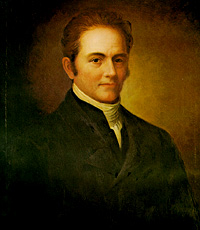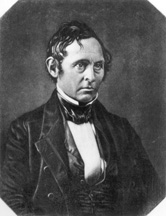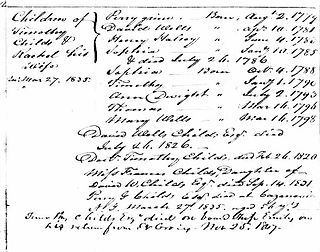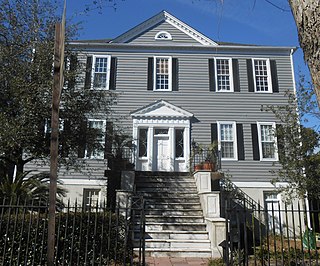
Langdon Cheves was an American politician, lawyer and businessman from South Carolina. He was a U. S. Representative from 1810 to 1815, served as Speaker of the House in 1814–1815, and was president of the Second Bank of the United States from 1819 to 1822.
The nullification crisis was a United States sectional political crisis in 1832–33, during the presidency of Andrew Jackson, which involved a confrontation between the state of South Carolina and the federal government. It ensued after South Carolina declared the federal Tariffs of 1828 and 1832 unconstitutional and therefore null and void within the sovereign boundaries of the state. However, courts at the state and federal level, including the U.S. Supreme Court, repeatedly have rejected the theory of nullification by states.

Willie Person Mangum was a U.S. Senator from the state of North Carolina between 1831 and 1836 and between 1840 and 1853. He was one of the founders and leading members of the Whig party, and was a candidate for president in 1836 as part of the unsuccessful Whig strategy to defeat Martin Van Buren by running four candidates with local appeal in different regions of the country. He is, as of 2021, the only major-party presidential nominee to have been a North Carolinian at the time of his nomination.

Hugh Swinton Legaré was an American lawyer and politician.

James Hamilton Jr. was an American lawyer and politician. He represented South Carolina in the U.S. Congress (1822–1829) and served as its 53rd Governor (1830–1832). Prior to that he achieved widespread recognition and public approval for his actions as Intendant (mayor) of the city of Charleston, South Carolina in 1822, during the period when plans for a slave rising were revealed. As governor, he led the state during the Nullification Crisis of 1832, at the peak of his power.

Robert Young Hayne was an American lawyer, planter and politician. He served in the United States Senate from 1823 to 1832, as Governor of South Carolina 1832–1834, and as Mayor of Charleston 1836–1837. He was a vocal proponent of the states' rights doctrine, in collaboration with John C. Calhoun and James Hamilton Jr.
The Nullifier Party was an American political party based in South Carolina in the 1830s. Considered an early American third party, it was started by John C. Calhoun sometime in May–December 1828.

John Peter Richardson II was the 59th Governor of South Carolina from 1840 to 1842.

Timothy Childs Jr. was a U.S. Representative from New York. He represented Monroe County for eight non-consecutive terms in Congress between 1829 and 1843.
Henry Laurens Pinckney was a U.S. Representative from South Carolina, and the son of Charles Pinckney and Mary Eleanor Laurens.

David Deas was the twelfth intendant (mayor) of Charleston, South Carolina, serving one term from 1802 to 1803.
Charles Burnham Cochran was the fifteenth intendant (mayor) of Charleston, South Carolina, serving one term from 1805 to 1806. He was elected on September 9, 1805. At the time, he lived at the house then-numbered 67 Meeting Street, Charleston, South Carolina. He had previously served as the federal marshal of the South Carolina District from 1795 to 1802. In 1806, he was elected treasurer of South Carolina for the lower division. Cochran died on August 21, 1833. He is buried at the Cathedral of St. Luke and St. Paul in Charleston, South Carolina.

Elias Horry was a lawyer, politician, businessman and plantation owner who twice served in the South Carolina General Assembly as well as the intendant (mayor) of Charleston, South Carolina, serving two terms from 1815 to 1817 and 1820 to 1821.

Daniel Stevens was the twenty-fourth intendant (mayor) of Charleston, South Carolina, serving from 1819 to 1820.

John Dawson Jr. was the sixteenth intendant (mayor) of Charleston, South Carolina, serving two terms from 1806 to 1808.

Thomas Rhett Smith was the twenty-first intendant (mayor) of Charleston, South Carolina, serving from 1813 to March 1815.

Thomas Winstanley was the eighteenth intendant (mayor) of Charleston, South Carolina, serving one term between 1804 and 1805. He had been elected as a warden for Charleston on September 23, 1801. On October 5, 1803, he was elected intendant pro tem during the absence of the intendant.
Thomas Leger Hutchinson was the thirty-fifth intendant (mayor) of Charleston, South Carolina. He served twice, defeating John Schnierle in 1846, being defeated by John Schnierle in 1850, and then beating John Schnierle again in 1852.
William Rouse was the eighteenth intendant (mayor) of Charleston, South Carolina, serving two consecutive terms from 1808 to 1810.
John Ward was the eleventh intendent (mayor) of Charleston, South Carolina, serving one term from 1801 to 1802.













